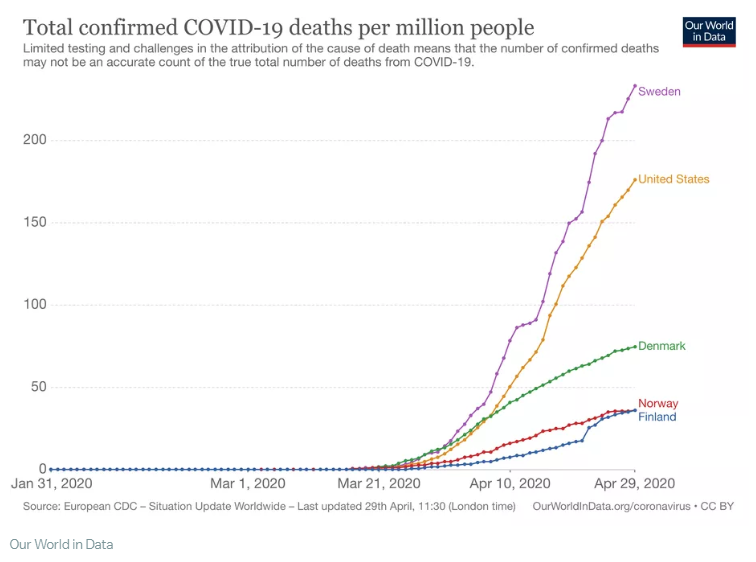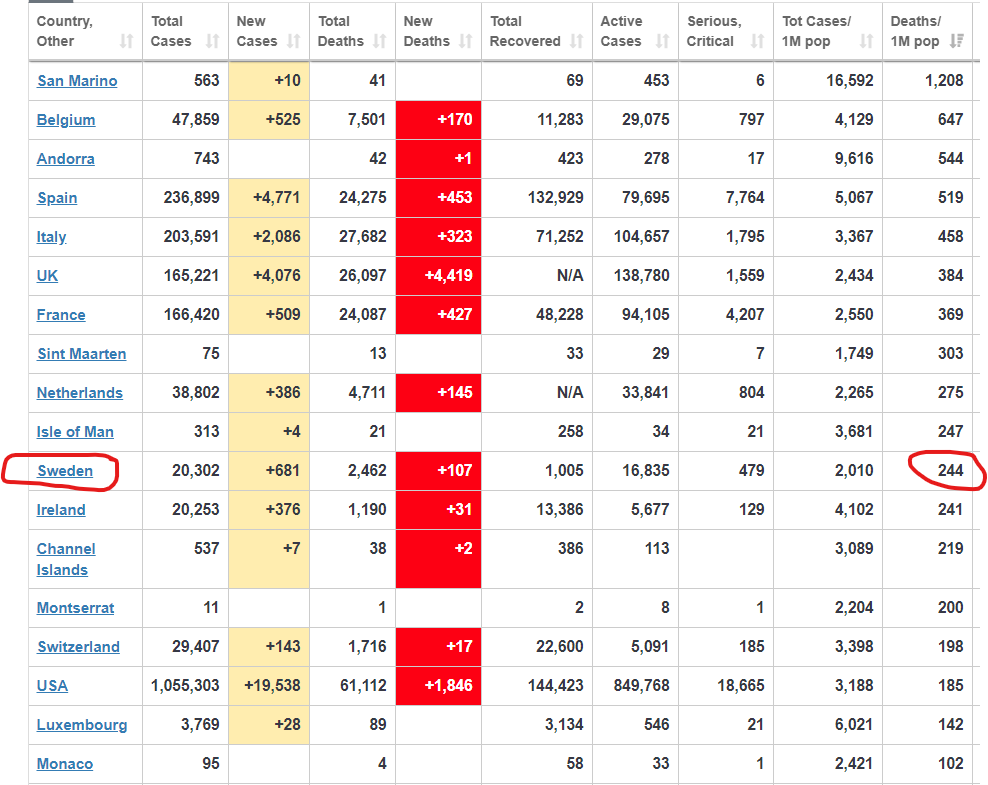SteadyOptions is an options trading forum where you can find solutions from top options traders. Join Us!
We’ve all been there… researching options strategies and unable to find the answers we’re looking for. SteadyOptions has your solution.
Leaderboard
Popular Content
Showing content with the highest reputation on 04/29/20 in all areas
-
Oh look the Monday morning quarterback. Death rate of the 50-60 range is 1.3% for men its about twice as high. So that would kill 1 in 50 men in that age category. So thats 200,000 dead men in that age category in the US - not that I am taking this personally because I am 53 or anything. Even bigger problem is that these 200,000 and in fact a multiple will require hospital care. There are currently 1,000,000 staffed hospital beds in the US - not even going into the ICU beds question - do you see a problem already? Sweden has 10M people in a very sparsely populated country with nowhere near the density of population even in its couple of bigger cities. Its also out of the way of major trade and traffic lanes and isolated by sea and unpopulated land areas. The population is also applying a level of self-discipline that is quite unlikely to be found in the US.The so called herd immunity is completely based on models and not on actual testing. They believe that for every confirmed case they have 75 unconfirmed ones but there is zero proof of that. in fact a more likely factor is 15 which is the normal transmission rate without measures. But even with the 75 factor they arrive at 23% immunised population in Stockholm (not elsewhere) which is not enough to be termed real herd immunity. I agree that the numbers touted of 60% are exaggerated but 35% (one third) really is a minimum. They are still by the most optimistic predictions 50% away from that by MID MAY. In the mean time they are accepting outsized death numbers in the higher age categories starting at 50. A second wave is unavoidable but prior experience shows that with measures in place you can contain it by isolating the cases. Which is what was successful in the predecessor MERS SARS cases but which this time around slipped out of our control. https://www.theguardian.com/commentisfree/2020/apr/29/us-responses-1918-flu-pandemic-offer-stark-lessons-coronavirus-now You might want to read that as real experience of what can and cannot be done. Herd immunity is a theoretical concept that does not take into account factors as health care and systemic stress from the deaths and ill people. Already now health care workers are struggling to stay healthy AND work double shifts to deal with the emergency. I agree that we should relax the measures as soon as possible but Sweden and New Zealand's example are about as logical as comparing the Swedish and New Zealand Stock Exchange to Nasdaq and NYSE.6 points
-
I think the real key will be once we get enough random tests performed that can be extrapolated into the general population of a state/city. The kind of tests recently performed on LA and NY. If wider testing confirms what the LA and NY tests found - that many more people have been infected without knowing it. If that happens.... It means the mortality rate is much lower than what is computed right now based on case counts and deaths, likely 0.5% or lower. We already know the elderly are the most at-risk with the average age of people dying ~80 (give or take). I live in the one of the hottest areas of Pennsylvania and that is the case here, with a large percentage of deaths being people in long term care facilities. Based on this, there will be tremendous pressures on states to open (albeit with social distancing restrictions) with the higher risk people in nursing homes and similar places remaining in tighter lockdowns. Government stimulus and payouts to citizens can't go on forever. Many people will get out an do things, many people won't at first. This is the critical period as to what happens next. Are more people getting admitted to hospitals, even those in the assumed lower-risk categories? And unfortunately, we can't ignore the political aspects of what happens in this scenario - you can be sure that the media will highlight anything negative.5 points
-
i haven’t seen any convincing evidence anywhere that CV19 deaths are being over reported. all cause mortality is up significantly in the US and way more in most other countries that have experienced an outbreak. There is a significant lag with collecting these data in some geos so it will likely only get worse. To me, that puts a definitive end to the argument around whether people are dying “from or with” the disease. im not expressing an opinion on the response from bureaucrats, I don’t know what the perfect answer may be. But I think caution when facing something unknown like this is warranted. the response in the markets is completely crazy and illogical. Personally I don’t think we’ve seen the worst of it. I can’t see how things don’t degrade again, especially when Q2 earnings are reported. But who knows...2 points
-
@Yowster you hit the nail on the head, University of Miami has been doing this in S FL and is finding exactly that. I think factoring that in, it worked out to the same or slightly less than .5% mortality rate. I think this virus has been spreading a lot longer than we were aware of, I'm thinking at least 3rd quarter of last year if not longer. I am in no way a Covid denier, yes it is serious, but a lot of these numbers are not adding up. Yes we need to be careful, yes large gatherings like sports, concerts, etc should not be happening right now. But I do believe there has been a tremendous amount of number fluffing going on - I am sure some of it is just heat of the battle and will get sorted out later, but I can't help but think some of it is nefarious. You can take that to the bank. Look at NY - oh, if you died at home, clearly you couldn't get to a Dr, so it must have been Covid. No proof, no autopsy, just increase the death count by 3k or 4k or whatever it was. There is financial incentive for hospitals to mark people as covid patients, and more money if they get on a ventilator. "Follow the money". With respect to hospital workers, of course they are not furloughing the front line, but all we heard about for weeks was how every hospital would be overflowing and there would not be enough capacity, not enough medical staff, not enough ventilators, etc etc. That simply is not the case. I'm glad they were wrong, but as a Floridian who has to deal with hurricane season and the media hype that "we will most certainly die this time", I try to strip the fanatical hype from factual data. All I am saying is the data does not match the fear. I am not sure where the saying originated, but it goes something like "there's lies, damn lies, and statistics". Interesting time to be on this floating Petri dish called planet earth. Rant over and sorry for completely derailing the Uber thread, but too I agree this cannot be good for Uber LOL2 points
-
Their number of deaths per 1M population is actually one of the highest in the world, despite the fact that Sweden has much lower population density than counties like US, and has much less international travel. Here are few points of view regarding Sweden approach: https://www.cnn.com/2020/04/28/europe/sweden-coronavirus-lockdown-strategy-intl/index.html https://www.vox.com/2020/4/28/21240381/coronavirus-sweden-death-rate-cases-new-york So at this point, it is still not clear if Swedish approach really works.2 points
-
While I'm not at all confident in what the market will do over the next 6-12 months (like you, I wouldn't be surprised to see another leg down), a few observations here: A major (and IMO, underrated) difference between now and six months ago is the fall in interest rates. Six months ago, T-bills were still yielding 1.55%, and long-dated treasuries were yielding around 2.25%. The latter is certainly not a great yield historically, but it was at least enough to outpace U.S. inflation for the past 10+ years. But as of today, T-bills are yielding 0.10% (!) and the 30-year treasury yields only 1.24%. It's hard to imagine why anyone would buy the former, except maybe foreign governments who have to hold U.S. debt for various reasons. And while I won't say there's no reason to buy a 30-year bond yielding 1.24%, the reasons are relatively few. It's certainly not a good value proposition, unless you think we're headed for a long, long period of deflation. The fall in interest rates alone may justify why the equity market is at these levels, despite a much worse economic outlook. All the money in the world--and there's more every day with Fed intervention (see below)--has to go somewhere. With rates this low, bonds aren't attractive, CDs aren't attractive, savings accounts aren't very attractive, etc. So I think a lot of the resilience we're seeing in stocks is just the natural attitude of, "Well, I'm not going to get any yield on my money elsewhere, so I guess I'll buy equities, hold them, and at least earn some dividends while I wait for prices to recover." That's especially true in the sense that people with the big money--the type of money that moves markets--often either can't or aren't allowed to just put it in CDs or high-yield savings accounts. Another factor is the Fed liquidity, which is much higher than it was six months ago. The Fed isn't directly buying equities, but their aggressive purchasing of bonds adds cash to the market that historically has a positive ripple effect into equities. This isn't news to probably anyone on SO, but the market isn't pricing today's economy or even next month's economy. It's looking much further out than that. I have absolutely no idea what will happen, but factoring in the massive monetary and fiscal stimulus, it's not crazy to think that we could be roughly back to where we were in 6-9 months. Some industries surely won't be back that fast, but others may pick up the slack. The market dropped so fast and so deeply, I think there's an argument that it basically managed to price in all of the worst economic news in an incredibly short amount of time. That said, if what I just said is correct, I think it only applies to economic news. I don't think the market has any way to efficiently price in developments about the severity or mortality of the virus yet, for all the reasons Kim said. So, if it turns out that the mortality rate really is sky high, or if we see a bad second wave later this year, I absolutely think that will hit the markets hard unless we've somehow managed to nail down a really good treatment or a vaccine by then. Just my random musings here. Grain of salt, etc.1 point
-
An interesting series of tweets from a medical professional not in NYC and the direct and indirect impact of reporting everything as if it was NYC. Link1 point
-
I believe the reported CV19 deaths are greatly inflated in the US. Hospitals have a great incentive to classify illnesses as CV19 because the government instituted new reimbursement rates 20% higher than other illnesses. During the same period in some areas the death rates for other illnesses are reported to be up to 50% lower than expected levels.1 point
-
Here is a link to an interesting interview with two Southern CA doctor's. https://www.youtube.com/watch?v=gZuwsEiRG54 Apparently, YouTube does not like the content because every 24 hours or so they delete it and then someone else will upload it again. This is the third, different link to the WHOLE (65 minutes) interview that I've found as I'm sending it to family members and if they don't view quickly, they find that it's been removed. What I appreciated was the information that they shared was based on the 5000 clients that they have tested. Real data, not model extrapolations. They also discuss the physical and economical effects of extended 'Shelter in place' for the healthy population, not a pretty picture, and why they are advocating for a removal of 'house arrest' as my daughters refer to our current state of lockdown.1 point
-
Yeah, that makes it pretty clear that they're not furloughing frontline ICU people, which is exactly what I thought. So I'm not sure what your point is. Empty hospital wings for elective surgeries and ambulatory care (meaning outpatient care) does not mean we "flattened the curve too much." It means the hospitals reallocated resources toward ICU and patients most likely to die in the short term.1 point
-
The positions are furloughed because there's no work and no revenue. I know people who work in the hospitals around the country (North Carolina, Arizona, California) and they've been saying this for weeks. https://www.wcvb.com/article/boston-medical-center-health-system-furloughs-hundreds-of-employees/31996394# BOSTON — Approximately 10 percent of the workforce of the Boston Medical Center Health System will be furloughed, the company said in a letter to workers Tuesday. The company said the approximately 700 workers will stop working temporarily but remain in active status with the expectation of returning. The company said the furloughs were occurring in areas where the patient volume or workload has decreased. Boston Medical Center Health System said the coronavirus pandemic has had a significant impact on the company's financial stability. "Our decision to significantly cut back elective surgeries and almost all of our ambulatory services means an immediate and major reduction in clinical revenue," the company said in its letter to workers. "As a result, we are currently projecting a very significant operating loss this year. Like other providers, we are in critical discussions with the state about options for stabilizing our finances."1 point
-
Made some money on preferred shares, and corporate bonds on tesla in the past as well. It's hard to beat IB for access to almost everything that is tradable, including foreign exchanges.1 point
-
I did not do a comprehensive research, but it seems to me that as a package (combination of commissions, platform, execution, trading abilities etc.) IB still offers the best package overall. Their commissions are not the lowest, but I average around 0.70/contract. tastyworks is 0.50/contracts ($1 to open free to close), but they have other fees (I believe they charge for assignment and exercise) plus significantly higher margin rates. Two big drawdowns of IB: terrible customer service and draconian margin call treatment.1 point
This leaderboard is set to New York/GMT-05:00




